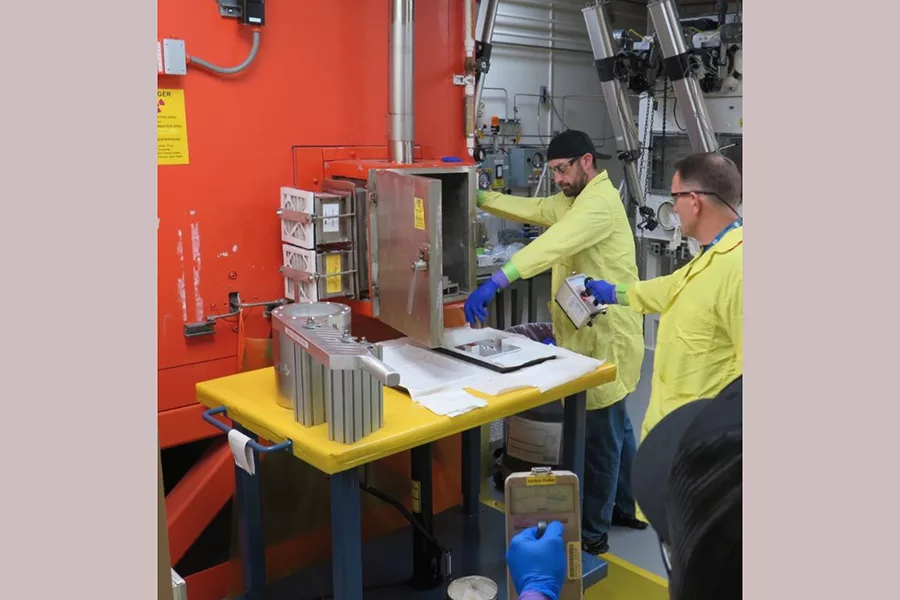
Home » Company harnessing radioisotopes has Tri-Cities connection
Creating reliable power sources
Company harnessing radioisotopes has Tri-Cities connection

Zeno Power has designed, built and tested the first-ever commercially developed radioisotope heat source, with help from Pacific Northwest National Laboratory. The milestone means Zeno Power is on track to begin delivering radioisotope power systems, or RPSs, to customers in 2025. Pictured is the PNNL team removing the Z1 heat source from transfer port.
December 14, 2023
Tyler Bernstein visited the Tri-Cities in 2019 for a conference at Pacific Northwest National Laboratory on nuclear and emerging technologies for space. And he left with two pieces of information that helped him bring to life a bold business venture – one that ultimately could be a boon for this area, creating jobs and dovetailing with the region’s growing clean energy efforts.
First, there’s an increasing need for reliable power sources in space.
And second, waste material at the Hanford site – specifically Strontium-90 – could play a key role in providing power for space exploration, as well as work in other off-the-grid places.
 Tyler Bernstein
Tyler BernsteinThat milestone – completed in Richland, with help from scientists at PNNL – means Zeno Power is on track to begin delivering radioisotope power systems, or RPSs, to customers in 2025.
An RPS is a kind of nuclear battery, converting heat from decaying radioactive isotopes into electricity.
Bernstein and his Zeno Power collaborators marked the important step during a recent visit to the Tri-Cities. The company’s mission is to “harness the power of radioisotopes to provide plug-and-play power anywhere in the universe,” Bernstein told a crowd of local scientists and leaders during an event to highlight the successful demonstration. And it felt good to celebrate the success in the Tri-Cities, which helped inspire the business in the first place, he said.
RSPs aren’t new – they’ve been around for years, helping to power space and maritime missions by agencies such as NASA and the defense department. But the systems haven’t been feasible for broader use for reasons including that they were too heavy or relied on isotopes that aren’t readily available.
Zeno Power aims to change that. In the recent demonstration, the company used Strontium-90, an isotope produced by nuclear fission that’s in supply at Hanford. And Zeno Power has come up with a design that makes for a lightweight, affordable and scalable product, officials said. The demonstration work took place at PNNL’s Radiochemical Processing Laboratory.
“(It) was done through what’s known as the strategic partnerships program, which provides a way for industry and universities and others ... to access the unique technical expertise and highly specialized equipment of DOE’s national laboratories to achieve goals that may otherwise be unattainable. This work is a great example,” said Jeff Katalenich, a PNNL research scientist and engineer who collaborated with Zeno on the project, during the celebration event at The Lodge at Columbia Point in Richland.
“We anticipate that PNNL’s observations and data measurements will be useful to Zeno, and it has been my pleasure to work with my team to apply PNNL’s capabilities to this effort,” he said.
Retired U.S. Navy Admiral John Richardson is part of Zeno Power’s advisory board. He told the crowd that the need for RPSs couldn’t be more urgent, as deep sea and space exploration expand.
“These types of systems provide that long, sustained energy in these areas where we want to be more present as a human race, but it’s still just a harsh operating area,” he said.
And the Tri-City area is a natural fit, he said.
“Partnering here, with PNNL and really just this region – what better place to go ... (than) this community, that was there at the birth of nuclear,” he said.
While Zeno Power officials haven’t detailed specific plans for the Tri-Cities, Bernstein has said that he envisions a long relationship between his company and the community.
David Reeploeg, vice president of federal programs for the Tri-City Development Council, or TRIDEC, agreed that such a relationship makes sense. “We are kind of the birthplace of nuclear technology ... and we’re excited about the work that Zeno is going to do to help carry that into the future,” he said during the event celebrating the demonstration. “And because of that history, and because of the great work of so many of our partners here in the community, we do feel like we have not only the workforce to support what Zeno is going to be doing in the future, we have strong community support, and we have a great desire to continue that long history.”
Zeno Power has offices in Washington, D.C., and Seattle. The company recently announced a $7.5 million contract from the Department of Defense to build an RPS to supply power on the seabed – the company’s third government contract announced this year, bringing the total to $40-plus million.
Energy





